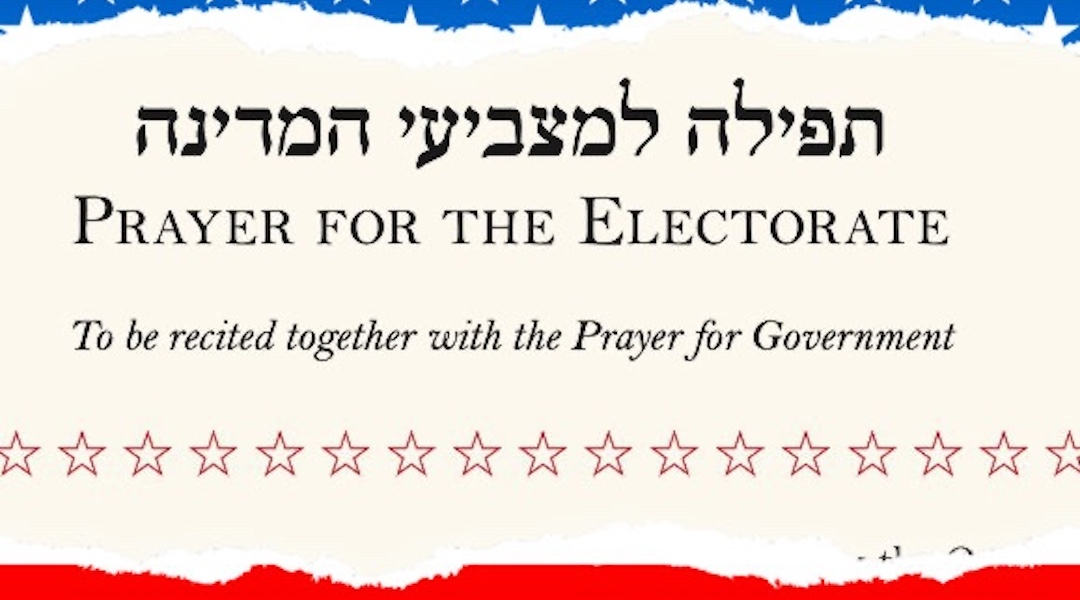This article initially appeared in My Jewish Learning’s Shabbat newsletter Recharge. To sign up to receive Recharge each week in your inbox, click here.
This Shabbat, like every Shabbat, synagogues around the world will pray for the welfare of their national government. Some will pray in Hebrew, others in the vernacular. The text of the prayers vary between nations and denominations, but the sentiment does not. Throughout the world, Jews pray that God should guide the government in its work.
Despite their variations, all popular versions of the prayer share a persistent and increasingly odd feature: They equate “prayer for the state” with “prayer for the executive.” In America, most synagogues pray for the president and vice president. In Canada, they pray for the prime minister. Jews in the United Kingdom pray for King Charles by name. The standard prayer for the State of Israel mentions its “leaders, ministers, and advisers.” (The telling exception is France, where Jews pray for “la République française et le peuple français.”)
It certainly makes sense that prayers for the state mention the officeholders empowered to run the state. What is universally absent, however, is any reference to the people who empower those officeholders in the first place: namely, the voters. This absence is particularly conspicuous given that the vast majority of the world’s Jewish adults have voting rights in their countries of residence. Why do we pray for our elected officials and not the people who elected them?
It’s obvious how we got to this place. The standard Hebrew text of the prayer for the government is more than 500 years old, long predating modern democracy. Prior to emancipation, the unelected rulers under which all Jews lived had an oversized role in determining their fate. In Europe, Jews often held the legal status of servi camerae regis, servants of the royal chamber. This relationship left Jews particularly vulnerable to the whims of kings and queens. A version of the prayer printed in Spain in 1490 lists the monarch as Fernando, the very ruler who would expel the country’s Jews just two years later. In such circumstances, praying for the government is best understood as a disenfranchised minority’s plea that the people who could make their lives miserable leave them in peace.
This sentiment carried over to America. A 1760 version from Congregation Shearith Israel in New York asks God to help King George as well as the leaders of New York’s state government. With the birth of the republic, American Jews shifted to speaking of offices rather than their holders — the president, not Joe Biden — but retained their focus on executive leadership. Democracy was acknowledged by diminishing specific leaders, but the prayers still typically centered on the highest office in the land.
Admittedly, there are some variations. A fascinating 19th-century version, recited in English, calls on God to aid “the Senate and House of Representatives of the United States of America in Congress assembled” — but only when they were in session. Later vernacular versions, notes the historian Jonathan Sarna, shift their emphasis from fighting between politicians to fighting between demographic groups. Even today, most Conservative synagogues ask God to “unite the inhabitants of our country.”
But inhabitants are not voters. Despite these endless variations, all the prayers for government have persisted in treating the electorate — and elections themselves — as less than a footnote in the composition of a democratic state. This omission is not only illogical, but it marginalizes the very people saying the prayers. The standard Hebrew text, which begins by invoking God as “the One who gives salvation to kings,” only makes sense if you elide the difference between kings and presidents — in other words, the electorate.
In October 2016, I composed a prayer to be said on the Shabbat before an election. Rather than request aid for elected officials, the prayer conveys the hope that voters will have the wisdom to select good leaders who guide the country justly and righteously.
The prayer serves four functions. First, like the prayer for the new month, it is a general reminder of something happening in the coming week. (If this sounds superfluous now, wait until the next off-year primary.)
Second, it connects the grand notion of “government” with the people in the room, thereby empowering them — and uniting them, albeit briefly, across their political differences.
Third, like the rabbinic prayer before entering a study hall, it sets a non-partisan intention: Elections have consequences, and voting should be understood as a weighty and holy responsibility.
Finally, at a time when so many American institutions are struggling, it bolsters the notion that free and fair elections are an essential part of our national identity.
Whether or not you believe prayers are divinely effective, they matter to the people in the room, and they can either be alienating or connecting. The standard prayer for government is about as alienating as possible. What does it even mean to pray to God (whom many congregants don’t connect with) to aid the president (whom most Americans will never meet)? In a political system that already leaves many people feeling like they’re not being heard, synagogues have an opportunity to celebrate and sanctify one of the most important rites of citizenship.
America was not always a full democracy. It is understandable that the rabbis tinkering with these prayers in the 19th century didn’t think to include voters when women could not vote and people of color could not reliably access the ballot box. Through the blood and sweat of countless activists we’ve become a little better. We should now celebrate that — and remind each other of the duty that citizenship entails.
JTA has documented Jewish history in real-time for over a century. Keep our journalism strong by joining us in supporting independent, award-winning reporting.







